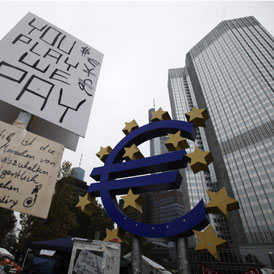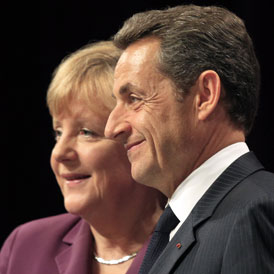Don’t rely on ECB to solve euro crisis – Germany
As Germany says the European Central Bank does not have “unlimited firepower” to come to the aid of indebted countries, an economist tells Channel 4 News it must do.
Prime Minister David Cameron and French President Nicolas Sarkozy are pushing for the ECB to take a more aggressive role in the eurozone debt crisis, but German Vice Chancellor Philipp Roesler said this would only be a short-term measure.
Speaking in Berlin, he said if the bank decided to print money to help Italy and other nations, “the impetus to create lasting stability and make reforms would disappear”.
But economist Dawn Holland, from the National Institute of Economic and Social Research (NIESR), told Channel 4 News she believed the ECB should take the lead role. “The problem in Italy is liquidity. They cannot raise money at a reasonable rate. That is going to push them into a crisis. We cannot afford to have a default on Italian debt. That would definitely cause a European banking crisis.”
Central banks
The ECB has played a more limited role in supporting the European economy than the Bank of England, in the UK, and the Federal Reserve, in the US which have printed money through a programme known as quantitative easing in the hope of encouraging economic activity.
The ECB has bought 180bn euros of government bonds on the markets to stabilise the interest rates countries like Italy pay when they borrow money – a policy opposed by the German Bundesbank.

‘Whatever it takes’
Ms Holland said a more muscular programme was needed. “They should be sending a message to the markets that they’re open to buying Italian debt, not just in the short term in limited quantities, but whatever it takes. What they’re doing is buying it up, but not advertising the fact. They’re keeping it quiet. They want to do as little as necessary.
“What is missing is a commitment to buy up whatever quantities (of Italian government bonds) are required to ensure Italy does not default. These bonds would sit as an asset at the ECB. Assuming Italy doesn’t default, the value wouldn’t fall, so at the end they’re redeemed.”
Sarkozy v Merkel
President Sarkozy has argued that Europe’s bailout fund, the European Financial Stability Facility (EFSF), should be allowed to borrow money from the ECB.
With the pressure on Italy increasing, Mr Cameron also believes the ECB has a critical part to play, saying in a speech on Thursday: “If the leaders of the eurozone want to save their currency, they and the eurozone institutions must act now together, because the longer they delay, the greater the danger.”

German Chancellor Angela Merkel is opposed to the idea of involving the ECB. For Germany, this would compromise the bank’s independence, while encouraging it to print money would lead to inflation – a grim reminder of the economic turmoil the country went through in the Weimar years.
The Germans are not alone. Klaas Knot, the head of Holland’s central bank and a member of the ECB’s governing council, told the Dutch parliament on Thursday printing money risked stoking inflation.
He added: “We have gone pretty far in what we can do, but there is not much more that can be expected from us. It is now up to the governments.”
There is not much more that can be expected from us. Klaas Knot, ECB
ECB executive board member Peter Praet also took a hard line, saying the bank should not intervene “when there are fundamental doubts about the sustainability of some countries”.
But the NIESR’s Dawn Holland said Europe’s leaders should not worry too much about inflation at the moment. “There’s not enough inflation for it to be a short-term concern.”
These differences of opinion explain why so much faith has been vested in boosting the firepower of the EFSF from 440bn to 1tr euros, money that has been used to support Ireland, Portugal and Greece.
European share prices rose today after the Italian senate approved the austerity package demanded by the EU. The package now has to be cleared by Italy's lower house on Saturday. Prime Minister Silvio Berlusconi has said he will step down when this happens. His departure is seen as a positive development by the markets.
Italy
This week, Italy’s borrowing costs rose to the 7 per cent level that triggered previous bailouts. But even with these increased resources, the fund would not be strong enough to cope with an Italian meltdown. Italy is the eurozone’s third biggest economy and has eye-watering debts of 1.9tr euros.
Worryingly for Italy and the rest of the eurozone, endowing the EFSF with a 1tr euro war chest may now be in doubt. The fund’s head, Klaus Regling, told the Financial Times: “The political turmoil that we saw in the last 10 days probably reduces the potential for leverage. It was always ambitious to have that number, but I’m not ruling it out.”
In October, EU leaders agreed to the 1tr euro figure, but it is not clear yet where the money will come from.